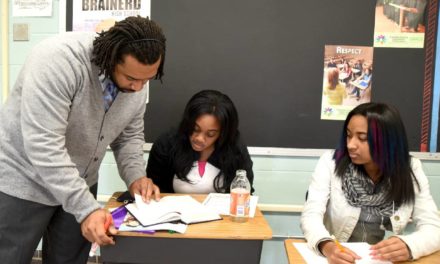
Asking yourself hypothetical questions can prepare you for a job interview, help you make changes at work, or further develop your career. You might dismiss these thought exercises as woo-woo or out of the realm of possibility. Save them for when you need an icebreaker or parlor game, right? But in 2019, not many higher education professionals were asking themselves, “What would happen if my entire university began operating remotely for more than a year?”
The following what-ifs and hypothetical questions are not intended to anticipate something that could actually happen, but instead to help you adapt to change or to think deeply about your career. Asking yourself these questions might help you land a job offer or achieve a small win to advance you beyond the status quo.

What if a Documentarian Followed You for a Day?
You’ve probably been asked the hypothetical question, “What would you do if today were your last day on earth?” You’d probably go home to see your family, eat a delicious meal, or do something dangerously fun. But what if it’s a regular day at the office? In his book “Die Empty,” author Todd Henry recommended pretending that you are joined by a guest whose job it is to follow you for a day and observe how you interact with people, perform tasks, and go about your work, all of which will stand as the definitive record of your life and work. In a way, this flips the job interview question that candidates often ask employers to describe a typical day and asks you to not only describe yours, but when you’re at your best. Asking this question might help you identify some performance gaps if you’re not meeting your own daily expectations.
What Would Your Replacement Do?
No one wants to think about losing their job, but that’s exactly what Dave Girouard, the CEO of Upstart, recommended in an interview with First Round Review. “(What if my board) went out and found the very best CEO in the world, one who would just make me look like a fool. And if they bring her in and she starts at Upstart — what would she do differently than what I’m doing?” Girouard said. “I think about that for a while, and then I tell myself, ‘Why the hell aren’t you doing those things?'” If you’re a job candidate or about to be considered for tenure, you might rephrase this question as “Who else are they going to hire?” and then it becomes a form of game theory: “What can you offer that most candidates can’t?” or “How can your strengths complement this institution’s potential weaknesses?”

What if Your Interview Was Limited to One Sentence?
The search committee read your 20-page CV with all of your committees and conference presentations listed, but often they want a candidate to summarize everything for them. By limiting yourself to one sentence or a professional mission statement, you can anchor your narrative to a main theme instead of blathering on and on about your past jobs or your dissertation. Sure, you may be asked to elaborate, but like an effective political campaign your job candidacy needs a repetitive slogan or phrase for which people will remember you. As shared by author Daniel Pink in his book “Drive,” U.S. congresswoman Clare Boothe Luce told President John F. Kennedy that “a great man is one sentence,” adding “Abraham Lincoln’s sentence was: ‘He preserved the union and freed the slaves.’ Franklin Roosevelt’s was: ‘He lifted us out of a great depression and helped us win a world war.'” Do you have a strong purpose? When coworkers or students describe you, would they have a clear sentence to summarize your work or is it a muddled paragraph? Establish your sentence so others clearly know. For example, author and marketing executive Felicia C. Sullivan, writing for Forge, suggested the sentence: “I seek to (your contribution) so that (impact).”
What if Your Workweek Was One Day Shorter?
Many higher education professionals wished they had more time to do their jobs, but let’s face it, Parkinson’s Law tells us that work expands to fill the time allotted. Instead, consider what companies like Microsoft Japan are doing by experimenting with four-day workweeks. In many instances, productivity increases because employees are better rested or they are more deliberate about how they spend their time. What would you do differently? Some people, including Wharton professor Adam Grant, believe that workers can be as productive and creative in six focused hours as in eight unfocused hours, so perhaps a better question is, “What would you do if your day ended two hours earlier?”
Continuing in the interest of brevity and one-sentence descriptions, here are a few more quick hypothetical questions to consider:
- What if your department’s budget was doubled? Instead of using scarcity to guide you, sometimes by considering if money wasn’t an issue, you’re able to think strategically instead of blaming a lack of resources.
- What if you could rewrite your job description? In doing so, you might find your ideal job can be designed at your current institution or doing this will help you know exactly what to look for in your job search.
- What if you didn’t invest all that time and money into your education? Higher education professionals are susceptible to the sunk-cost fallacy because earning a Ph.D. requires such a huge, yet narrowly focused commitment, and then they forsake their happiness by not widening their career options.
- What’s the least it would take for you to walk away from your job without another offer?There are a lot of things that would make you quit your job (budget cuts, leadership change or heel turn, etc.), but it’s always good to know your threshold so you can concentrate on doing your job well, instead of your itchy feet, that is, until a better offer comes along.
- What if you’re smarter than everyone interviewing you? This is helpful if you have impostor syndrome, as well as if you’re eager to match your wits with a group of presumed highbrow intellectuals, but you’re always better off skipping the jargon and abstractions, whether writing succinctly for a journal article or speaking plainly in a job interview.
- What if there’s another pandemic? Instead of assuming a global pandemic is a centenary event, it helps to be ready to adapt to another remote-work environment and learn from mistakes that occurred during the COVID-19 pandemic.
Hypothetically speaking, this exercise could never end, but asking yourself the right questions about pretend circumstances could lead you to a better reality in your career.



